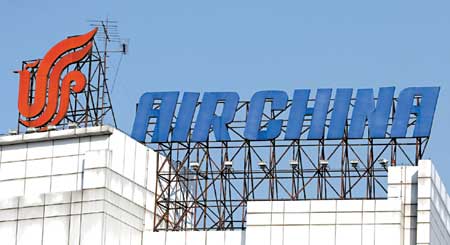Center
Air China records solid net profit
By Lu Haoting (China Daily)
Updated: 2006-04-20 07:09
 |
Large Medium Small |
Air China Ltd, the nation's flagship carrier, reported on Tuesday a 0.85 per cent rise in its net profit for 2005, while its domestic rivals continue to fly in the red.

The Hong Kong listed company said robust passenger and cargo volumes helped boost its operating revenue by 14.23 per cent to 38.29 billion yuan (US$4.78 billion). Its net profit reached 2.41 billion yuan (US$300 million), up from 2.39 billion yuan (US$298 million) in 2004.
But due to a substantial rise in the cost of jet fuel, Air China's operating profit decreased by 18.1 per cent to 3.67 billion yuan (US$458 million).
"2005 was an extremely difficult year for the global aviation industry. As with other carriers, the rising cost of jet fuel was a major challenge for us," Air China Chairman Li Jiaxiang said.
"Despite this, we remained the most profitable airline among the major carriers in China as we successfully used a number of strategies to improve operations and contain costs," Li said.
He said the measures included forward contracts to hedge costs, computerized flight planning systems to reduce cost overruns and improved flight route planning to minimize the distance flown.
Air China's profit growth was in stark contrast to the annual report of China Eastern Airlines. The Shanghai-based airline, China's third largest carrier, last week posted a net loss of 438.7 million yuan (US$54.5 million) for 2005, compared with a 2004 profit of 456.4 million yuan (US$56.7 million). The company blamed the loss on a 64 per cent jump in fuel costs last year.
China Southern Airlines, China's largest carrier by fleet, will soon release its full-year financial report. It posted a net loss of 907 million yuan (US$113 million) for the first half of 2005. Its full year net loss could exceed 1 billion yuan (US$120 million), said Ma Xiaoli, an aviation analyst at CITIC Securities.
Ma said Air China enjoyed a cost advantage over its rivals because it can buy jet fuel abroad at lower prices since about half of its flights are international.
Other Chinese carriers' revenues mainly come from domestic traffic. They have to buy fuel for domestic flights from the monopolizing State-owned oil supplier China Aviation Oil Holding Co.
Air China's long-standing prevalence in Beijing also helps it maintain its leading position in China, in terms of profitability, Ma said.
"As the nation's capital city, Beijing enjoys the busiest air traffic in China. Beijing is Air China's hub and the carrier has not experienced strong competition from its domestic rivals so far," Ma said.
Beijing, Shanghai and Guangzhou are the main aviation hubs in China. But Shanghai is the fierce battle-ground of two airlines China Eastern and Shanghai Airlines. In Guangzhou, China Southern and Shenzhen Airlines fight head to head.
"But Air China will face more challenges in the coming years as other airlines move to the north," Ma said.
China Southern opened a branch in Beijing at the end of last year and planned to spend 1.09 billion yuan (US$136 million) building a hub here. Other airlines such as China Eastern and Hainan Airlines are also preparing to strengthen their presence in North China.
(China Daily 04/20/2006 page9)